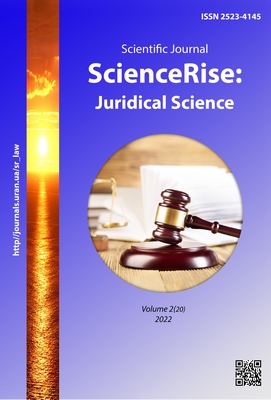Правові засади європейської інтеграції України
DOI:
https://doi.org/10.15587/2523-4153.2022.260085Ключові слова:
правові умови європейської інтеграції, Європейський Союз, Угода про асоціацію, УкраїнаАнотація
Метою статті є аналіз тенденцій розвитку правового забезпечення європейської інтеграції України. По суті, Угода про асоціацію з Україною відрізняється від угод про асоціацію, підписаних Європейським Союзом на початку 1990-х років із країнами Центральної Європи, які готуються до ЄС, або з Близьким Сходом, Північною Африкою та Латинською Америкою, які не мають жодних шансів. вступу до ЄС. Узгодження питань європейської інтеграції України залежить від ефективності механізмів функціонування правового інституту суспільства як організованого суспільством апарату, відповідального за формування, дотримання та реалізацію правовідносин юридичних осіб. Правовий порядок Європейського Союзу не передбачає особливої процедури вступу. У червні 1993 р. були розроблені Копенгагенські критерії членства, які охоплюють здатність країни-кандидата мати функціонуючу ліберально-демократичну політичну систему, впроваджувати європейське право в національне законодавство та мати економіку, здатну конкурувати на спільному ринку ЄС. Європейський Союз створив прецедент для допуску держави до невирішеного територіального конфлікту, коли він прийняв грецьку частину Кіпру 1 травня 2004 року. За межами ЄС лише Турецька Республіка Північного Кіпру залишається визнаною Туреччиною. Ця проблема залишається невирішеною і гальмує конструктивні переговори щодо вступу Туреччини до Європейського Союзу. Тому питання визнання України кандидатом на членство в ЄС має широкий геополітичний контекст. Україна співпрацює з Європейською комісією над погодженням процедури переговорів про вступ до Європейського Союзу. Європейський Союз має різні стратегії ведення переговорів про вступ нових країн
Посилання
- Iakovlev, A. (1999). Teoreticheskie problemy sotciologi prava. Moscow, 380.
- Gegel, G. (1990). Filosofiia prava. Moscow, 440.
- Ionin, L. (2000). Sotciologiia kultury. Moscow, 500.
- Kazimirchuk, V. (1995). Sovremennaia filosofiia prava. Moscow.
- Kulchar, K. (1981). Osnovy sotciologii prava. Moscow, 256.
- Karbone, Zh. (1986). Iuridicheskaia sotciologiia. Moscow.
- Olіinik O. Reformuvannia iuridichnoi ritoriki v Ukrainі: evroіntegratcіia ta adaptatcіia natcіonalnogo zakonodavstva і prava Ukraini do zakonodavstva ta prava ES. Vіche, 18, 27–29.
- Tkachenko, R. L. (2017). Evroіntegratcіia u Radі: shcho ochіkuvati vіd novogo parlamentskogo roku. Ukrainska pravda, 11–14.
- Chernіkov, D. V. (2015). Evroіntegratcіia u zakonakh: kіlkіst ne perekhodit u iakіst. Polіtika, 28–30.
- Ospanov, S. (2002). Sotciologiia prava. Almaty, 334.
- Bartoshek, M. (1989). Rimskoe pravo. Poniatiia, terminy, opredeleniia. Moscow, 448.
- Mark, K. (1990). Ekonomicheskie i filosofskie rukopisi. Moscow.
- Luhmann, N. (1994). Politische Planung. Aufsätze zur Sociologie von Politik und Verwaltung. Hamburg.
##submission.downloads##
Опубліковано
Як цитувати
Номер
Розділ
Ліцензія
Авторське право (c) 2022 Sergey Asaturov, Andrei Martynov

Ця робота ліцензується відповідно до Creative Commons Attribution 4.0 International License.
Наше видання використовує положення про авторські права Creative Commons CC BY для журналів відкритого доступу.
Автори, які публікуються у цьому журналі, погоджуються з наступними умовами:
1. Автори залишають за собою право на авторство своєї роботи та передають журналу право першої публікації цієї роботи на умовах ліцензії Creative Commons CC BY, котра дозволяє іншим особам вільно розповсюджувати опубліковану роботу з обов'язковим посиланням на авторів оригінальної роботи та першу публікацію роботи у цьому журналі.
2. Автори мають право укладати самостійні додаткові угоди щодо неексклюзивного розповсюдження роботи у тому вигляді, в якому вона була опублікована цим журналом (наприклад, розміщувати роботу в електронному сховищі установи або публікувати у складі монографії), за умови збереження посилання на першу публікацію роботи у цьому журналі.










